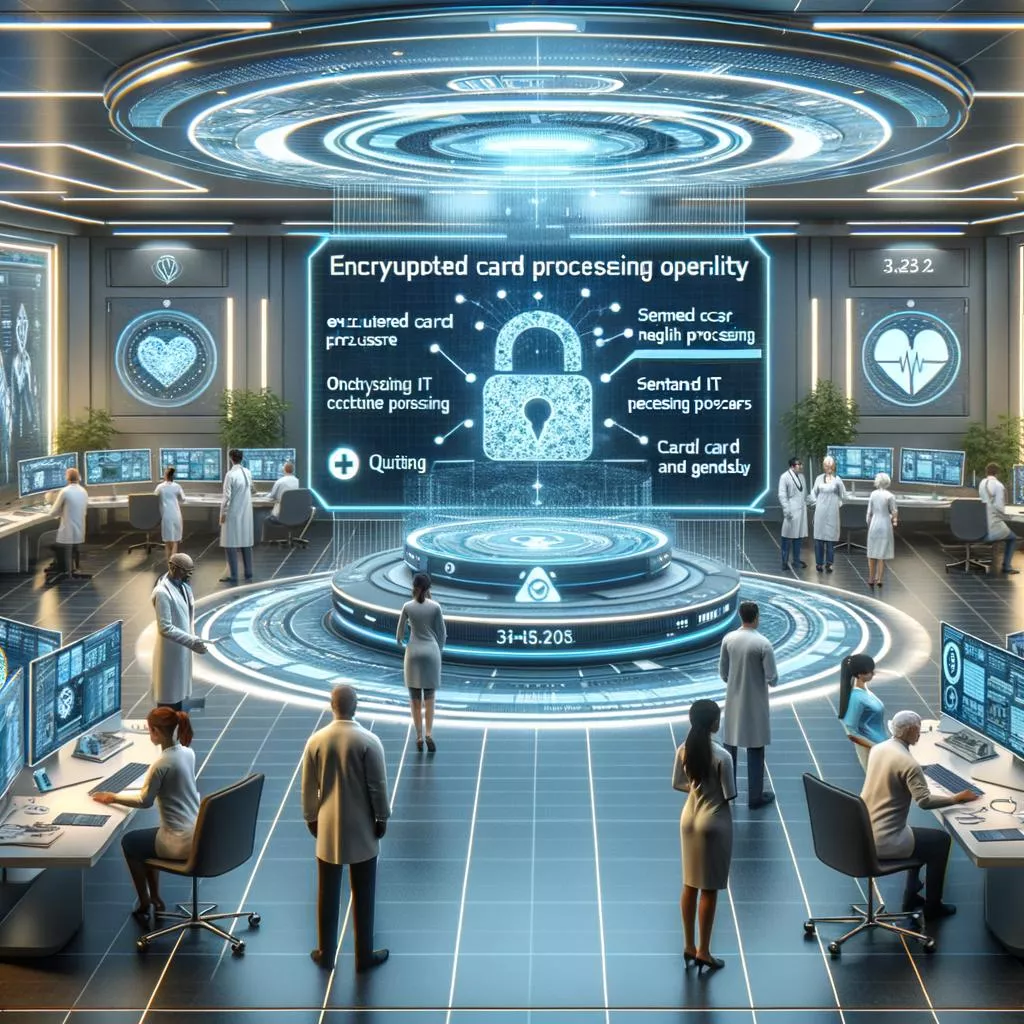Ensuring Data Security in Card Processing for Medical and Healthcare Services
Attention, fellow data warriors and guardians of digital fortresses! Brace yourselves as we dive headfirst into the realm of card processing in the medical and healthcare domain, where data security reigns supreme. In this electrifying article, we unveil the secrets of mastering the art of protecting sensitive information, ensuring that our trusted healthcare heroes and their invaluable patients can sleep soundly knowing their data is safe and sound. So, gear up and join us on this captivating voyage as we unveil the most epic strategies to ensure data security because, let’s face it, it’s time to armor up and conquer the battlefield of card processing for medical and healthcare services!
Protecting Patient Privacy: Safeguarding Data in Card Processing for Medical and Healthcare Services
In today’s digital age, protecting patient privacy and safeguarding sensitive data in card processing for medical and healthcare services has become more crucial than ever. With advancements in technology, it has become easier for hackers and cybercriminals to gain unauthorized access to personal information. As a result, it is imperative for medical and healthcare institutions to prioritize data security to ensure the safety and confidentiality of their patients.
One of the key steps in ensuring data security is to implement robust encryption measures. By encrypting card processing data, healthcare providers can prevent unauthorized individuals from deciphering and accessing sensitive information. This can be done by utilizing strong encryption algorithms that scramble data into unreadable formats, making it virtually impossible for hackers to retrieve any useful information. Additionally, implementing multi-factor authentication can provide an extra layer of security, requiring users to provide multiple forms of verification before accessing sensitive data.
Another crucial aspect of protecting patient privacy is investing in secure technology infrastructure. Healthcare institutions should employ state-of-the-art firewalls, intrusion detection systems, and other security measures to prevent cyberattacks. Regular security audits and vulnerability assessments can help identify any weaknesses in the system and address them promptly. Moreover, healthcare providers should establish strict access control measures, granting permissions to only authorized personnel who have undergone thorough background checks. By limiting access privileges to only those who genuinely require it, the risk of data breaches and privacy violations can be significantly reduced.
In conclusion, ensuring data security in card processing for medical and healthcare services is of utmost importance to protect patient privacy and uphold the integrity of the healthcare industry. By implementing strong encryption measures, multi-factor authentication, and investing in secure technology infrastructure, healthcare institutions can minimize the risk of data breaches and safeguard sensitive information. It is essential for medical and healthcare providers to prioritize data security to not only comply with regulatory requirements but also to build trust and confidence among their patients.
Critical Measures: Ensuring Robust Security in Card Processing for Medical and Healthcare Services
In an era where advanced technology and digital transactions dominate the healthcare industry, ensuring robust security in card processing is of utmost importance. Medical and healthcare services often rely on the convenience of card payments, but the sensitive nature of the data being exchanged requires us to prioritize data security above all else.
To achieve this, there are critical measures that medical and healthcare organizations must adhere to. Firstly, employing strong encryption protocols is essential to protecting cardholder information. By utilizing industry-standard encryption algorithms, we can ensure that all data transmitted during card processing is securely stored and transferred, making it virtually impossible for unauthorized parties to access sensitive information. Additionally, implementing two-factor authentication can add an extra layer of security, requiring users to provide two forms of identification, such as a password and a unique verification code sent to their registered mobile device. This ensures that only authorized individuals can access and process card transactions, minimizing the risk of data breaches.
Best Practices for Data Encryption in Card Processing for Medical and Healthcare Services
Data security is a critical concern when it comes to card processing for medical and healthcare services. The sensitive nature of patient information and the increase in cyberattacks make it vital for organizations to implement best practices for data encryption. By using robust encryption measures, healthcare providers can safeguard patient data and mitigate the risks associated with unauthorized access.
One of the best practices is to use end-to-end encryption. This ensures that sensitive cardholder data is protected from the moment it is entered into the system until it reaches the payment processor. By encrypting data at multiple points throughout the transaction process, the risk of interception or tampering is significantly reduced. Additionally, healthcare organizations should adopt the use of strong encryption algorithms, such as AES (Advanced Encryption Standard), to ensure maximum security.
- Implement end-to-end encryption to protect cardholder data throughout the transaction process.
- Use strong encryption algorithms like AES (Advanced Encryption Standard) for maximum security.
- Regularly update encryption protocols to stay ahead of emerging threats.
- Invest in secure payment gateways that offer robust encryption features.
Furthermore, it is crucial to regularly update encryption protocols to stay ahead of emerging threats. As cybercriminals constantly develop new techniques to bypass security measures, healthcare organizations must remain proactive in applying the latest encryption updates and patches. To enhance data security, organizations should also consider investing in secure payment gateways that offer robust encryption features and maintain PCI DSS compliance.
| Best Practices for Data Encryption | Benefits |
|---|---|
| Implement end-to-end encryption | Protects sensitive cardholder data from interception or tampering |
| Use strong encryption algorithms | Ensures maximum security for patient information |
| Regularly update encryption protocols | Stays ahead of emerging threats and enhances data security |
| Invest in secure payment gateways | Provides robust encryption features and maintains PCI DSS compliance |
Mitigating Risks: Implementing Precautionary Steps in Card Processing for Medical and Healthcare Services
Section:
When it comes to card processing in the medical and healthcare industry, ensuring data security is of utmost importance. With the increasing threats of cyber attacks and data breaches, it is crucial for medical institutions to take precautionary steps to protect sensitive patient information. Implementing robust measures not only safeguards patient data but also builds trust and confidence among patients and healthcare providers.
To mitigate risks in card processing for medical and healthcare services, a multi-layered approach is necessary. Here are some key steps that can help in fortifying data security:
- Implementing encryption: Encrypting cardholder data is an effective way to protect sensitive information from unauthorized access. By converting data into an unreadable format, even if hackers manage to infiltrate the system, the stolen data would be useless.
- Regular software updates: Keeping card processing software up to date is essential for patching vulnerabilities and fixing any security loopholes. This ensures that the system is equipped with the latest security features, making it more resilient against potential threats.
- Strong access controls: Implementing robust access controls, such as multi-factor authentication and role-based permissions, adds an extra layer of security. By limiting access only to authorized personnel, the risk of unauthorized access or data leakage is significantly reduced.
- Employee training and awareness: Educating and training employees on data security best practices is crucial. By fostering a culture of security awareness, employees become proactive in identifying and reporting potential security risks, further bolstering the overall security posture.
Implementing these precautionary steps ensures that card processing in the medical and healthcare sector remains secure and protected from potential risks. By staying proactive and continuously improving security measures, medical institutions can confidently process card payments while safeguarding patient data.
To Wrap It Up
So there you have it, folks! We’ve delved into the crucial world of data security in card processing for medical and healthcare services. Hopefully, you’ve gained some valuable insights into the importance of safeguarding sensitive information in this fast-paced digital era.
Remember, while we may be living in the age of technological wonders and conveniences, it’s vital for medical and healthcare service providers to stay vigilant and up-to-date with the latest security measures. This ensures that both their patients and their businesses are protected from potential data breaches and cyber threats.
Whether you’re a medical professional, a healthcare service provider, or simply someone who cares about the safety of personal information, it’s crucial to understand the potential risks involved and take the necessary precautions. After all, prevention is always better than cure!
So, next time you find yourself swiping your card at a medical facility or sharing your personal details online, rest assured that steps are being taken to ensure your data is handled with utmost care. From encryption protocols to secure servers, the world of data security is constantly evolving to keep up with the ever-increasing threats.
Let’s continue to champion the cause of data security, giving medical and healthcare service providers the power to protect their patients and build trust in this digital age. Together, we can ensure that the confidential data entrusted to these institutions remains safe and sound.
So, as you go about your day, whether it’s administering a dose of medicine or filling out paperwork, always remember the crucial role data security plays in your line of work. Because at the end of the day, keeping our information safe is not just a responsibility; it’s a privilege we owe to each other. Stay secure, stay informed, and let’s keep our digital world a safer place.






